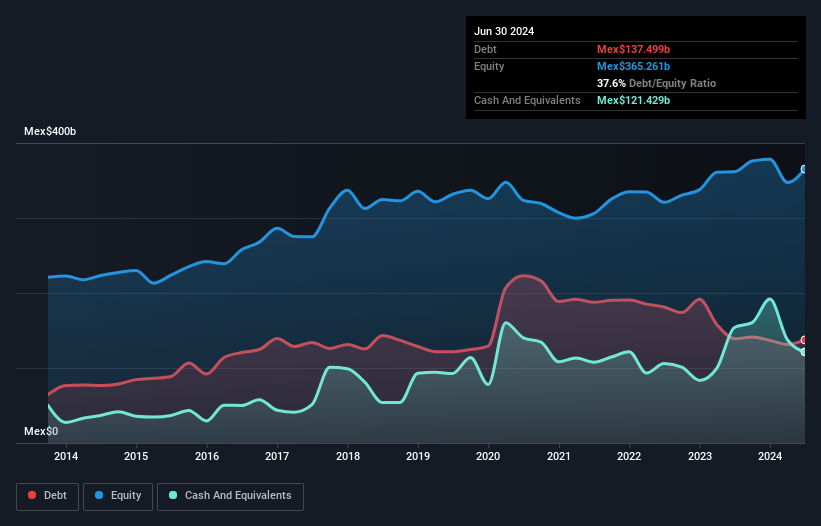Fomento Económico Mexicano. de (BMV:FEMSAUBD) Has A Somewhat Strained Balance Sheet

The external fund manager backed by Berkshire Hathaway's Charlie Munger, Li Lu, makes no bones about it when he says 'The biggest investment risk is not the volatility of prices, but whether you will suffer a permanent loss of capital.' So it might be obvious that you need to consider debt, when you think about how risky any given stock is, because too much debt can sink a company. Importantly, Fomento Económico Mexicano, S.A.B. de C.V. (BMV:FEMSAUBD) does carry debt. But should shareholders be worried about its use of debt?
Why Does Debt Bring Risk?
Debt is a tool to help businesses grow, but if a business is incapable of paying off its lenders, then it exists at their mercy. In the worst case scenario, a company can go bankrupt if it cannot pay its creditors. While that is not too common, we often do see indebted companies permanently diluting shareholders because lenders force them to raise capital at a distressed price. By replacing dilution, though, debt can be an extremely good tool for businesses that need capital to invest in growth at high rates of return. The first step when considering a company's debt levels is to consider its cash and debt together.
Check out our latest analysis for Fomento Económico Mexicano. de
How Much Debt Does Fomento Económico Mexicano. de Carry?
The chart below, which you can click on for greater detail, shows that Fomento Económico Mexicano. de had Mex$137.5b in debt in June 2024; about the same as the year before. However, it does have Mex$121.4b in cash offsetting this, leading to net debt of about Mex$16.1b.

How Healthy Is Fomento Económico Mexicano. de's Balance Sheet?
The latest balance sheet data shows that Fomento Económico Mexicano. de had liabilities of Mex$204.4b due within a year, and liabilities of Mex$250.7b falling due after that. Offsetting this, it had Mex$121.4b in cash and Mex$59.9b in receivables that were due within 12 months. So its liabilities outweigh the sum of its cash and (near-term) receivables by Mex$273.8b.
Fomento Económico Mexicano. de has a very large market capitalization of Mex$619.2b, so it could very likely raise cash to ameliorate its balance sheet, if the need arose. But we definitely want to keep our eyes open to indications that its debt is bringing too much risk.
We use two main ratios to inform us about debt levels relative to earnings. The first is net debt divided by earnings before interest, tax, depreciation, and amortization (EBITDA), while the second is how many times its earnings before interest and tax (EBIT) covers its interest expense (or its interest cover, for short). This way, we consider both the absolute quantum of the debt, as well as the interest rates paid on it.
Fomento Económico Mexicano. de has a low net debt to EBITDA ratio of only 0.25. And its EBIT covers its interest expense a whopping 14.3 times over. So we're pretty relaxed about its super-conservative use of debt. It is just as well that Fomento Económico Mexicano. de's load is not too heavy, because its EBIT was down 33% over the last year. When it comes to paying off debt, falling earnings are no more useful than sugary sodas are for your health. When analysing debt levels, the balance sheet is the obvious place to start. But it is future earnings, more than anything, that will determine Fomento Económico Mexicano. de's ability to maintain a healthy balance sheet going forward. So if you're focused on the future you can check out this free report showing analyst profit forecasts.
Finally, a business needs free cash flow to pay off debt; accounting profits just don't cut it. So it's worth checking how much of that EBIT is backed by free cash flow. Over the most recent three years, Fomento Económico Mexicano. de recorded free cash flow worth 54% of its EBIT, which is around normal, given free cash flow excludes interest and tax. This cold hard cash means it can reduce its debt when it wants to.
Our View
We feel some trepidation about Fomento Económico Mexicano. de's difficulty EBIT growth rate, but we've got positives to focus on, too. For example, its interest cover and net debt to EBITDA give us some confidence in its ability to manage its debt. We think that Fomento Económico Mexicano. de's debt does make it a bit risky, after considering the aforementioned data points together. Not all risk is bad, as it can boost share price returns if it pays off, but this debt risk is worth keeping in mind. Above most other metrics, we think its important to track how fast earnings per share is growing, if at all. If you've also come to that realization, you're in luck, because today you can view this interactive graph of Fomento Económico Mexicano. de's earnings per share history for free.
At the end of the day, it's often better to focus on companies that are free from net debt. You can access our special list of such companies (all with a track record of profit growth). It's free.
New: AI Stock Screener & Alerts
Our new AI Stock Screener scans the market every day to uncover opportunities.
• Dividend Powerhouses (3%+ Yield)
• Undervalued Small Caps with Insider Buying
• High growth Tech and AI Companies
Or build your own from over 50 metrics.
Have feedback on this article? Concerned about the content? Get in touch with us directly. Alternatively, email editorial-team (at) simplywallst.com.
This article by Simply Wall St is general in nature. We provide commentary based on historical data and analyst forecasts only using an unbiased methodology and our articles are not intended to be financial advice. It does not constitute a recommendation to buy or sell any stock, and does not take account of your objectives, or your financial situation. We aim to bring you long-term focused analysis driven by fundamental data. Note that our analysis may not factor in the latest price-sensitive company announcements or qualitative material. Simply Wall St has no position in any stocks mentioned.
About BMV:FEMSA UBD
Fomento Económico Mexicano. de
Through its subsidiaries, operates as a franchise bottler of Coca-Cola trademark beverages worldwide.
Flawless balance sheet established dividend payer.
Similar Companies
Market Insights
Community Narratives



